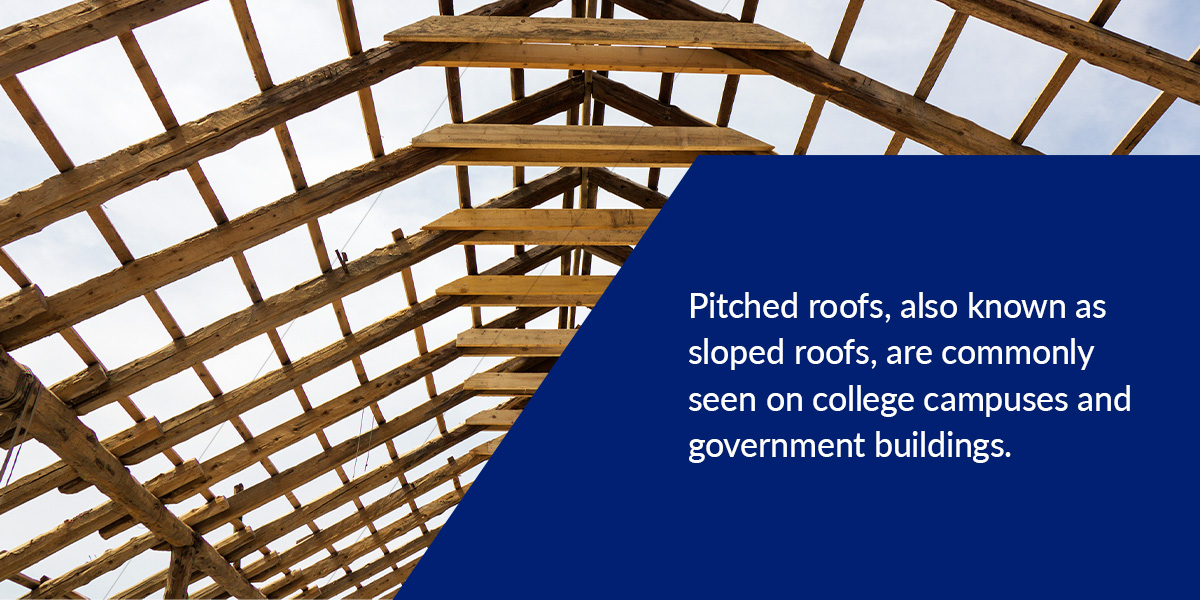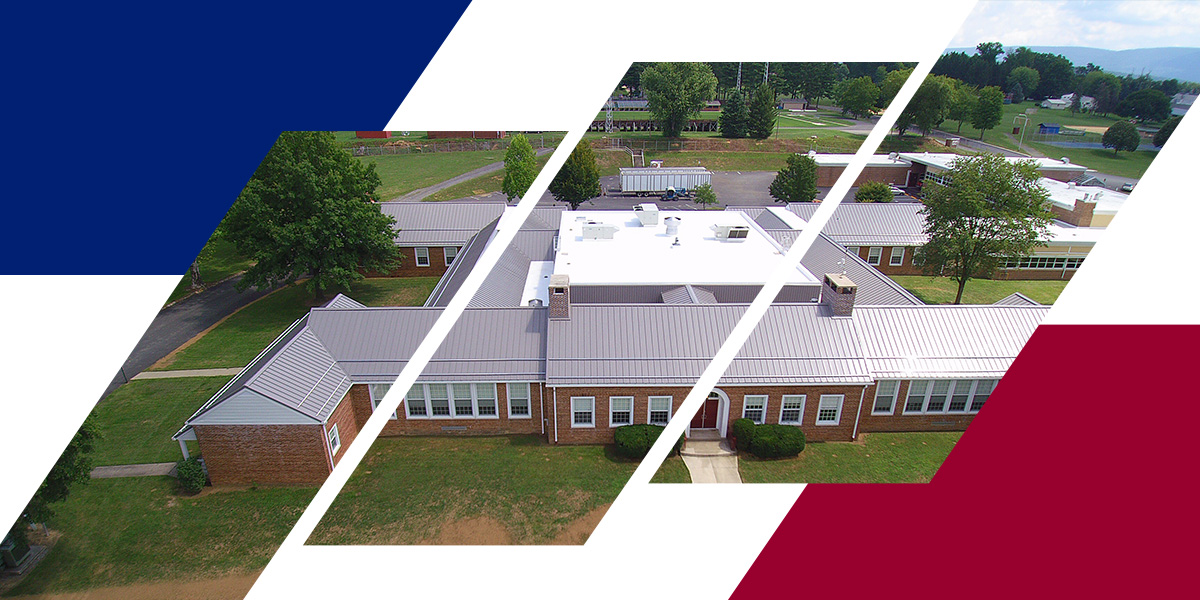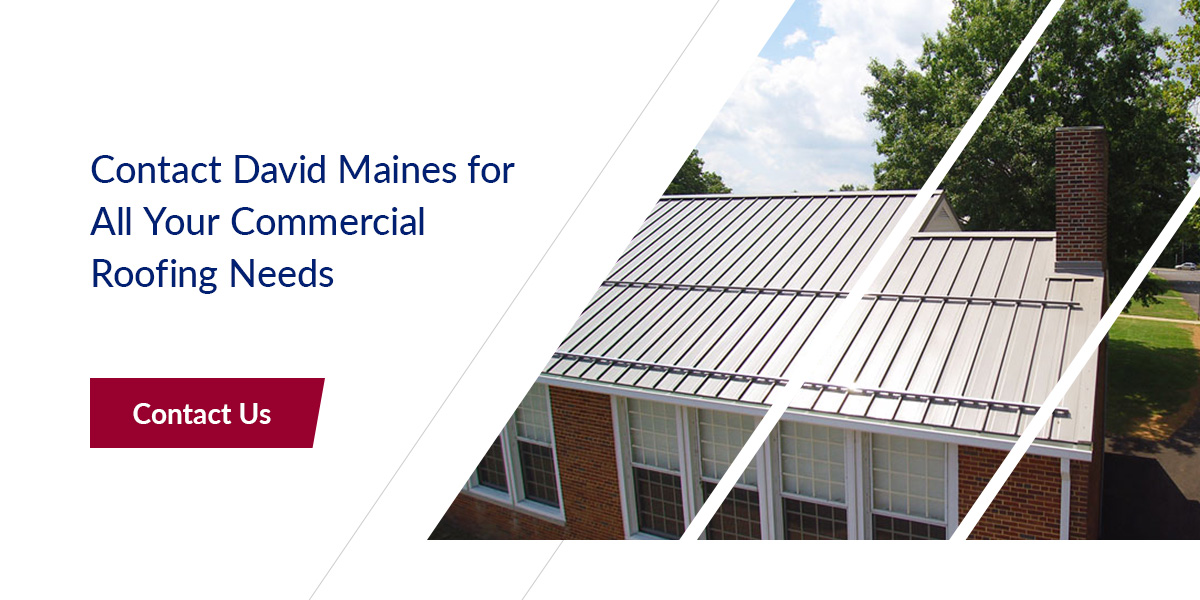Choosing the right roof for your commercial building may feel overwhelming. There are many factors to consider, including cost, durability, maintenance and aesthetics. Because roofing is a long-term investment, it’s important to weigh the pros and cons of your decision carefully.
Unsure if you should choose a flat or pitched roof? Both roof types have benefits for commercial buildings. Although there’s no right answer when choosing your next roof, we can help you navigate your options and find the best choice to meet your needs.
Choosing Commercial Flat Roofs
Many commercial building owners love flat roofs because they’re affordable, convenient and easy to maintain. However, flat roofs tend to have shorter life spans and sometimes experience drainage problems, leading to more maintenance.
Here’s more about the pros and cons of choosing a flat roof for your commercial building.
Pros of Flat Roofs
Flat roofs have many benefits. Because they don’t have a slope, they offer easy storage space for necessary building components like HVAC systems, access doors and solar panels. If they’re built to be walked on, they also make the roof extremely accessible for maintenance and storage purposes.
Flat roofs can’t be seen from the ground and often give buildings a box-like appearance. You can pair them with a false front to give the front of your building a fancier shape if you’d prefer — however, flat roofs look professional on many commercial buildings.
This kind of commercial roof is also highly cost-effective. They’re more affordable than pitched roofs, partly because of the materials used and partly because they’re simple to install. Working on a flat roof is also much safer than installing or fixing a pitched roof.
If you’re interested in installing solar panels, flat roofs are a better choice than pitched roofs. Attaching and maintaining solar panels on a flat surface is easier and more affordable than a sloped one.
Cons of Flat Roofs
Although flat roofs are an excellent choice for commercial buildings, there are a few cons to installing one. The most common issue is trouble with draining water after rain and snow since flat roofs don’t have a slope for water to roll down.
If water is left standing on a flat roof for too long, it can cause leaks and structural damage to the building. However, when a flat roof is properly installed, your roofing technicians will put in a drainage system to help prevent standing water and any ensuing damage.
Although flat roofs are often more affordable than pitched roofs to install, they don’t have as long of a life span. Flat roofs are completely exposed to the elements 24/7, unlike pitched roofs, which are exposed in sections over the course of the day. Although some materials can last longer, flat roofs last around 20 years on average.
If you choose high-quality materials, flat roofs will last longer and return more for your investment. However, higher-quality materials will likely cost more upfront, and you’ll still need to consider the standing water issue.
Choosing Commercial Pitched Roofs

Pitched roofs, also known as sloped roofs, are commonly seen on college campuses and government buildings. They tend to be more decorative, adding complementary colors and textures to commercial buildings. However, pitched roofs are generally more expensive than flat roofs to install and more challenging to access for repair.
Learn more about the pros and cons of sloped roofs for commercial buildings.
Pros of Pitched Roofs
Although pitched roofs take a larger financial investment initially, they tend to last longer than flat roofs. Of course, this depends on the materials you choose and the climate where your business is. Like with flat roofs, high-quality materials are more expensive but last longer than lower-cost options.
Pitched roofs can greatly enhance the architecture and aesthetics of a commercial building. Sloped roofs are visible from the ground, and there are many different ways to finish them. You can choose from many colors, textures and materials to make the right impression.
With a sloped roof, there’s a much smaller risk of water damage. As long as everything is properly sealed, water will run down the roof and out through the gutter system, with no danger of pooling and causing damage. If you’re in an area with high precipitation, you might want to consider a sloped roof for this reason.
In addition to sloughing off water, sloped roofs offer increased indoor space, often used for storage.
Cons of Pitched Roofs
There are some cons to choosing a pitched roof for your commercial building. Because of their shape, sloped roofs are often more complex to design and install. For example, they may have multiple dormer windows and several sides to the roof.
Because of this complexity, installing pitched roofs usually costs more than putting on a flat roof. This is partly due to installation costs — installation takes longer because workers must be secured to work on the sloped roof safely. The materials for sloped roofs are also often more expensive than those used for flat roofs.
A sloped roof is more difficult to access for repairs. Rather than opening a door and walking out onto a flat roof, workers must wear personal protective equipment so they can safely move down the sloped sides. Although most debris will roll off a sloped roof, removing what remains is more of an ordeal than cleaning off a flat roof.
Flat Roof vs. Pitched Roof: Which Is the Right Choice for Your Commercial Building?
Choosing the right roof for your building is a matter of weighing the pros and cons to find the best fit for your goals. Here are several factors to consider when deciding between a sloped roof vs. flat roof:
- Financial cost
- Storage space
- Roof aesthetics
- Material durability
- Maintenance needs
Depending on your building project, some of these factors will be more important than others. While no roofing decision is perfect, you can find a solution that meets your needs and has few cons for your building.
Contact David Maines for All Your Commercial Roofing Needs
Still not certain what the best option is for your commercial roof? Contact the team at David Maines & Associates, Inc., for professional help finding the best solution for your project. We operate throughout the Mid-Atlantic states.
We have experience installing both flat and sloped roofs for commercial businesses and specialize in quality roofing materials like EPDM rubber, shingles, metal, tile and slate. After you contact us, we can offer you a free inspection with suggestions for the best service for your roof.
At David Maines, we always put the customer first. Our team is experienced, professional and trustworthy. After safety, our top priority is getting your job done right and communicating clearly throughout the process.
Contact us today to learn more about the best roofing solution for your commercial building!
Share

